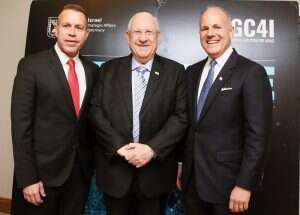Marking the largest international anti-BDS conference in the world, the Annual Global Coalition 4 Israel Forum and the Legal Network Initiative were held in parallel in Jerusalem last week.
The conference was originally established in 2011 to combat the global boycott, sanctions and divestment movement, anti-Semitism, anti-Zionism and ongoing attempts to delegitimize the State of Israel.
Follow Israel Hayom on Facebook and Twitter
Initiated by the Ministry of Strategic Affairs, this year's meeting hosted 350 pro-Israel and Jewish leaders and activists from 40 countries, with the goal of strengthening and consolidating the global pro-Israel advocacy network.
Guest speakers also included leading government officials and global experts on topics such as law and counterterror financing.
US Special Envoy to Monitor and Combat Anti-Semitism Elan Carr made a series of remarks on the worrisome rise of anti-Semitism in the world, as well as its ties to the BDS movement.
Recently appointed to counter anti-Semitism throughout the world and advise US Secretary of State Mike Pompeo, Carr called the BDS movement anti-Semitic and declared, "Anti-Zionism is pure hatred of Jews."

He added that "a reluctance to condemn it in the same way we condemn old anti-Semitism is extremely dangerous for all of us."
Some of the most troubling arenas of anti-Semitism, Carr said, include the United Nations, Europe, US Congress, American college campuses, as well as many US synagogues, which have been the target of the most recent deadly anti-Semitic attacks in the United States.
Carr deemed the rise of anti-Israel bias at North American universities, "a danger to the future of the Jewish community in America" and a phenomenon that must "be condemned resoundingly."
In Europe, he said, a recent survey found that 80% to 90% of European Jews see anti-Semitism as a serious problem, and one-third are even considering leaving their respective countries. He remarked that European leaders take the rise in anti-Semitism seriously, and are "embarrassed that 75 years after the crematoriums stopped operating, Jews are afraid to leave their houses, and are afraid for the safety of their children going into the streets with their kippot [Jewish skullcaps]."
Responding to the rise of anti-Semitic attacks at synagogues, Carr suggested that every Jewish institution use armed guards. "God willing, may they never be needed, but they should be there," he said.
'A positive impact on the masses'
Even with the many challenges that Jews face around the world, Carr maintained that anti-BDS victories, such as the recent decision by the German Bundestag to compare BDS to anti-Semitism, are not by chance, but "because of the efforts by the United States, the State of Israel and Jewish organizations, including many of the people in the audience, are doing incredibly important work on this issue and are making the case better than ever before."
At the conference, Isaac Herzog, chairman of the Jewish Agency, also mentioned the German parliament's recent legislation as an example of the importance of "promoting legal tools" to combat delegitimization of Israel, which he called "possibly the most important battle of the State of Israel in the current era."
Of course, he condemned global anti-Semitic attacks, and suggested that exposing positive stories of Israel through emissaries around the world will "make a positive impact on the masses."
IDF Chief Military Advocate Gen. Sharon Afek spoke about Israel's strategic challenges through a legal lens, criticizing the recent UN Human Rights Council's condemnation of Israel in March, which criticized Israel without demanding that Hamas stop all terror activities along the Gaza border and beyond. "The Israeli army is committed to abiding by the law and will continue to do so, no matter whether its adversaries do the same," he said.
At a discussion of how pro-Israel activists can work together worldwide to defend Israel's legitimacy, representatives from the United States, Israel, South Africa, Colombia, and Spain shared their particular challenges with Israel delegitimization. Ben Swartz from South Africa called the conference a "galvanizing moment" for the Jewish Diaspora, which "successfully brought activists and leadership together" to discuss strategies in the fight against delegitimization.
Moderator David Brog of the Maccabee Task Force noted that while circumstances are particular to each individual country, the challenges of delegitimization are often replicated around the world. "The Jewish community is thriving like never before, but we can see the looming threats and know it can change very quickly," he said.
IDF Brig. Gen. (Res.) Sima Vaknin-Gil similarly expressed her concern that while the delegitimization campaign has no real impact yet, it has "the potential to become more serious," representing a strategic threat against Israel and Jewish communities around the world. She suggested that a "holistic, synergetic approach" with "historical perspective" is needed in order to properly address the threat.
Tzahi Gavrieli, acting director general of the Ministry of Strategic Affairs and Public Diplomacy, posited that the last three years have been largely successful in terms of countering delegitimization and BDS. While international leaders used to view BDS as a legitimate movement for human rights, advancing the perception of BDS as a "local grassroots" movement of "unconnected events," over the last few years in 42 major organizations have shown that it is a network with terror links to Hamas and the Popular Front for the Liberation of Palestine, with robust sponsorship. This work has led to Canadian, British and German leaders calling out BDS as anti-Semitism.
Now, according to Gavrieli, these organizations are tasked with working together to proactively re-strategize and find new tools to delegitimize the delegitimizers.
This article is reprinted with permission from JNS.org.




